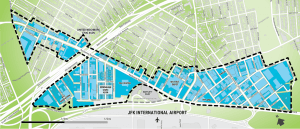
In 2019 John F. Kennedy International Airport handled more than 1.3 million tons of air cargo. Photo ©Wikimedia Commons.
This new research project will help to identify best practices to facilitate truck movements and minimize truck wait time at JFK International Airport for land-side cargo movements through a systems analysis of cargo movement and logistics. In partnership with GatewayJFK, this research project will estimate the economic benefits to the airport and surrounding communities of improved air cargo flow.
The JFK International Airport contributed more than $52 billion in economic activity to the New York City region in 2019 according to the Port Authority of New York and New Jersey 2019 Air Traffic Report.
During that year the airport served more than 60 million passengers and handled more than 1.3 million tons of air cargo. A major trade facilitator in the NYC region, and worldwide, air cargo helps create jobs, develop local and international economies, and deliver vital goods ranging from vaccines and pharmaceuticals to the mail.
A new research project between Rutgers Center for Advanced Infrastructure and Transportation (CAIT), GatewayJFK, partner institutions and private consulting firms, aims to estimate the effects of improving cargo systems at JFK International Airport and research the potential benefits of an airport-wide Cargo Information System to coordinate air cargo ground operations and speed truck traffic flow within the airport and surrounding community.
Dr. Kazem Oryani, an adjunct assistant professor at the Farmingdale State College School of Engineering Technology and CAIT-affiliated researcher, is leading the project. He said that this research will examine truck movements and determine best practices to minimize truck wait times at JFK Airport through intelligent monitoring of the system and perform analytics to improve operational efficiency going forward.
“This includes cargo getting on and off planes, ensuring security and customs compliance, streamlining warehouse operations, and coordinating airport operations with freight forwarders and truckers to expedite the flow of export and import cargo,” he said. “We expect to prove that optimizing the cargo flow system will generate economic improvements for the local communities and businesses surrounding the airport.”
Research will include exploring the potential development of a mobile app and the requirements key stakeholders may have to voluntarily use the application, Dr. Oryani said. This tool could potentially help inform truck drivers when and where cargo is available for pickup, manage truck dispatching, and collect important data on how cargo is moving throughout the facility.
Traffic congestion around the airport and truck transit, entrance and exit times, impact the air cargo system, commuters, airline passengers and other traffic. As part of the project, researchers are also developing a prototype transportation model of both passenger cars and trucks to assess wait-time components such as entry to and egress from the airport, estimated wait-time at cargo facilities to drop and pick up cargo, and the time needed to navigate through the airport.
“By better understanding what causes congestion within the airport’s cargo systems, we can begin to make more informed decisions and improve efficiency along the system,” Dr. Oryani said.
He added that this research will also include estimates of economic benefits stemming from a reduction in truck wait time and smoothing the flow of truck traffic to and from the airport. An economic model will estimate the value of these operational improvements to businesses depending upon, and communities surrounding, the JFK Airport.

A map of the Greater GatewayJFK community. Photo ©GatewayJFK.
According to project partner and sponsor GatewayJFK, a not-for-profit organization serving the area around the airport, there are approximately 600 businesses, 150 households, and 8,000 employees in the surrounding region that contribute to New York’s multi-billion-dollar air-cargo sector.
Dr. Oryani said that the expected reduction in truck wait-times, identification and lessening of traffic bottlenecks, and economic benefits of this project have the potential to impact all airport community members. Researchers also plan to hire student interns from the nearby Queens College as part of the effort to serve the local community. This research is the initial phase of a project to develop and implement an airport-wide cargo information system to serve JFK’s cargo business community.
This research began as one of CAIT’s University Transportation Center (UTC) projects, “JFK Truck Flow Management System: A system to speed Truck Traffic Flow at JFK Airport,” designed to define and document JFK Cargo requirements, evaluate options and costs to acquire, develop, and manage the system, and explore potential business models to operate, monetize it, and establish it.

